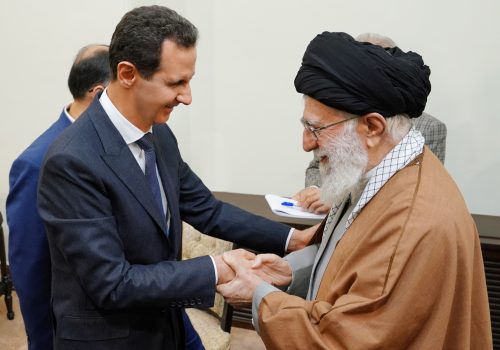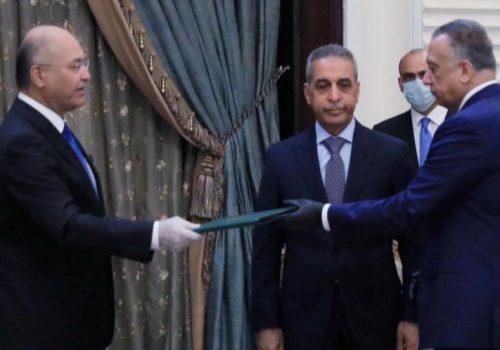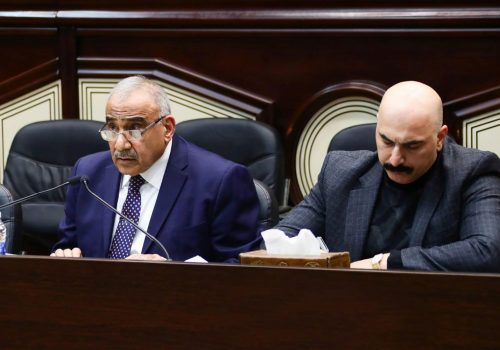Can Kadhimi curb the influence of Iran-backed militias in Iraq?
Notwithstanding Iraqi Prime Minister Mustafa al-Kadhimi’s desire to bring all of Iraq’s armed groups under the authority of the state, Iran-backed Shia militias have stepped up their relentless campaign of undermining the state’s sovereignty yet again. This comes despite the fact that they are suffering from a lack of leadership after the United States assassinated Abu Mahdi al-Muhandis, the most influential commander of the Popular Mobilization Forces (PMF), and Quds Force commander Qasem Soleimani, and diminished resources due to the US “maximum pressure” policy on Iran. However, because of these circumstances, Kadhimi has a historic opportunity to reclaim Iraq’s sovereignty. Can he be successful?
Kadhimi’s reaction to the militias’ escalation of tensions
On September 13, Grand Ayatollah Ali al-Sistani, Iraq’s highest Shia authority in Iraq, met with Special Representative of the Secretary-General for the United Nations (UN) Assistance Mission for Iraq, Jeanine Hennis-Plasschaert, in his humble house in Najaf. During this meeting, Sistani offered a rare expression of support to Kadhimi’s efforts to end pro-Iran militias’ incursion on Iraqi sovereignty. “The current government is required to continue and proceed firmly to… impose the prestige of the state and withdraw unauthorized weapons” said Sistani.
Unsurprisingly, pro-Iran militias disapproved of Sistani’s message. Four days after the meeting, on September 17, they targeted the American Institute for English Language in the middle of the night with an IED, damaging the building. The private language school, located a couple of miles from Sistani’s house, is unaffiliated with the United States. In spite of this, Telegram channels affiliated with pro-Iran militias accused the language school of working for US intelligence services.
Since Kadhimi assumed office in early May, the number of attacks against US interests has increased. Furthermore, British interests and even UN convoys have been targeted; there were some twenty-five attacks on the latter in September alone. Some of the Iran-backed groups behind these acts are not ordinary militias. They go about their activities with a brazen assertion, confident that they are above the law. In late June, Iraq’s Counter Terrorism Service (CTS) arrested fourteen members of Kataib Hezbollah (KH) on suspicion of planning to fire rockets at Baghdad airport and the US embassy. The pro-Iran militia quickly gathered together a force of around 150 heavily armed fighters in nearly thirty pickup trucks and drove to the prime minister’s residence, demanding the release of their comrades who were in custody. Later, all fourteen arrested members of KH were freed and the rocket attacks only increased.
Fearing the worst
Baleegh Abu Galal, a member of the Political Bureau of the National Wisdom Movement, an influential Shia political party, stated in an August 16 interview that if Iraq fails to bring unregulated arms under the control of the state, the country will either witness a civil war or foreign military intervention. The main foreign power which might intervene in Iraq is the United States. Abu Galal’s concerns in this regard feel more realistic after reports of the US intention to close its embassy in Baghdad, which will be likely followed by airstrikes on pro-Iran militias. This is what prevents Kadhimi from escalating against the militias. He has, however, began implementing changes among the civilian and military leadership to strengthen the security forces and fight the corruption that is the economic lifeline for rogue militias. Alterations in the military leadership include the selection of Lieutenant General Abdul-Wahab al-Saadi—a widely praised commander who is known for his competence and professionalism—as head of the Counter Terrorism Service (CTS). Changes in the leadership of the Iraqi central bank and other financial organizations target widespread corruption. For years, corrupt officials have used these organizations to enrich themselves along with the political parties and militias they belong to. The new reshuffle aims at cracking down on these activities.
This is a good start, but it is important to keep two points in mind. First, Iraq’s history reveals that half measures are not enough to make these ideological militias retreat. Groups such as KH are unlikely to give up their arms voluntarily or through negotiations. One of the reasons they will not abandon their arms is their belief in millenarianism—that they are answering to a higher calling (which is outside the scope of this piece). Thus, they will remain committed to siphoning off Iraq’s sovereignty to the best of their ability. They are well aware that sovereign states are antidotes to the Iran-led ‘axis of resistance.’ It is naive to think that KH and similar Iraqi militias—such as Asaib Ahl al-Haq, Harakat al-Nujaba, Saraya al-Khorasani—are going to compromise without genuine pressure to do so.
Secondly, despite flexing their muscles, Iran-backed Shia militias in Iraq are actually at their weakest in years. If a patriotic prime minister cannot rein in their influence now, they will only grow in power, eroding whatever is left of Baghdad’s authority. Following the assassination of Muhandis and Soleimani in January, the militias are still suffering from lack of leadership. They are also under financial strain due to the Trump administration’s “maximum pressure” policy on Iran, which has denied Tehran billions of dollars in revenues and plummeted oil prices in the international market, restricting their access to corrupt money inside Iraq as the Iraqi budget has shrunk.
Additionally, pro-Iran militias are under pressure from a largely Shia protest movement, which started in October 2019 and vehemently objects to foreign meddling in their county—be it the US or Iran. This same movement forced Prime Minister Adil Abdul-Mahdi to resign and compelled Iran and its allies to agree with Kadhimi’s nomination as a compromise. Sistani’s support for limiting the militias’ influence comes as one additional factor that showcases grassroots Iraqi support for curbing Iranian-militias’ sway.
The way forward
It is time for Kadhimi to impede further infiltration inside state institutions by groups such as KH. He can begin by diversifying commanders of the PMF which are mainly pro-Iran militiamen at the moment. Currently, KH occupies important positions, such as the acting chief of staff and head of the powerful security directorate inside the organization. Prime Minister Kadhimi should use the dissatisfaction of the Sistani-affiliated units within the PMF to put pressure on the PMF commission head Falih al-Fayyadh to achieve more heterogeneity. Diversifying the PMF chain of command can be accomplished by appointing patriotic commanders to key posts who believe in a truly sovereign Iraq.
Four Sistani-affiliated PMF units defected from the military organization in April. They expressed their willingness to facilitate defection of other units from the PMF commission. They are now administratively and operationally linked to the office of Prime Minister Kadhimi, the commander in chief. This move is still incomplete but has the potential of creating a parallel umbrella organization of various militias—one that receives its commands from the Iraqi prime minister rather than Iran. This plan, if completed, can also significantly damage Iran-backed militias’ legitimacy in the eyes of the Shia majority population in Iraq. Kadhimi should use this opportunity to make a credible threat to oblige more pragmatic Iran-affiliated militias, such as the Badr Brigade, to support him in his endeavors to diversify the chain of command inside the PMF.
Militia economic offices are another area that Kadhimi can focus on. He has already announced his campaign to rein in border corruption, an important source of income for many Iran-backed militias. But he has so far failed in controlling the cross-border trade between Iraq and Syria, where pro-Iran militias, such as KH and al-Tufuf Brigade, have created their own border points to facilitate illegal trade and transfer fighters and weapons. KH and similar militias are also present in sectors such as finance, construction, and oil. So far, nothing concrete has been done to curb the militias’ illegal economic activities.
It is highly likely that KH and other brigades will confront Kadhimi if he pursues any or all of the aforementioned steps. The prime minister needs to be ready to use force if needed. Those opposing the use of force against rogue militias argue that the move will result in an all-out civil war either between pro-Iran militias and sections of the Iraqi military or between various Shia militias themselves. To avoid such a bleak scenario, Kadhimi needs to be more resolute about imposing non-military solutions to reduce the influence of rogue militias, a process he has already started. He also needs to be frank with his partners in the political and social spheres that the time may come to conduct limited military operations to achieve this goal. As reports of the US intention to close its embassy in Iraq shows, if the Iraqi government fails to rein in Iraqi militias, it will face profound ramifications which threaten its stability even further.
Dr. Hamdi Malik is a Middle East analyst for Iran International TV and a contributor writer for Al-Monitor. He is co-author of the monograph, Honored, Not Contained: the Future of Iraq’s Popular Mobilization Forces, published by the Washington Institute for Near-East Policy. Follow him on Twitter: @HamdiAMalik.
Sign up for all the latest updates!
Sign up for the MENASource newsletter, highlighting pieces that follow democratic transitions and economic changes throughout the region.
Image: Kataib Hezbollah Iraqi militia gather ahead of the funeral of the Iraqi militia commander Abu Mahdi al-Muhandis, who was killed in an air strike at Baghdad airport, in Baghdad, Iraq, January 4, 2020. REUTERS/Thaier al-Sudani


